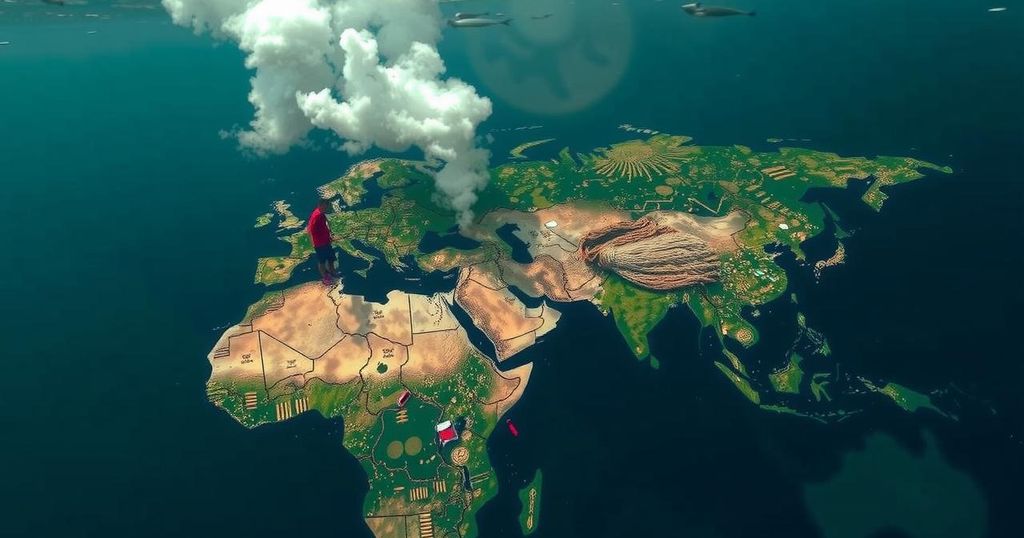UN Highlights Climate Crisis Escalating Global Refugee Displacement Challenges

The UN reports that climate change is worsening the refugee crisis, as record numbers of individuals are displaced by conflicts exacerbated by climate events. Currently, 120 million people are forcibly displaced, with weather-related disasters displacing 220 million over the past decade. The UNHCR emphasizes the need for increased funding for adaptation and resilience to mitigate further crises.
The United Nations has warned that the climate crisis is significantly exacerbating the already dire situation of refugees and displaced individuals worldwide. Recent reports from the UN refugee agency reveal that climate change is increasing the displacement of people, with extreme weather events and high temperatures compelling individuals to leave their homes. As conflict intertwines with these climate-induced emergencies, vulnerable populations face heightened risks, particularly in countries like Sudan and Somalia. UNHCR chief Filippo Grandi emphasized the pressing nature of the situation, noting that 75 percent of displaced individuals reside in nations severely affected by climate hazards. Currently, an estimated 120 million people are forcibly displaced due to conflict, violence, or persecution, with this number doubling over the last decade. Furthermore, internal displacement due to weather-related disasters has reached approximately 220 million over the past ten years, equating to nearly 60,000 displacements each day. Andrew Harper, a special advisor on climate action at UNHCR, underscored the alarming rise in displacement and the urgent necessity for increased funding to support affected individuals and the communities hosting them. The UNHCR warns that the situation is on a trajectory to worsen dramatically, with the number of countries facing severe climate-related threats potentially rising from three to 65 by 2040. By 2050, the majority of refugee camps are expected to experience significantly more days of dangerous heat, adversely affecting inhabitants through discomfort, health risks, and threats to agricultural stability. With low-income nations typically hosting these settlements—often in prone areas unable to effectively manage climate challenges—there is a critical need for enhanced international climate financing. Harper has highlighted the shocking disparity in adaptation funding, where fragile states receive as little as $2 per person, compared to $161 in more stable nations. The UNHCR emphasizes that investment in climate adaptation is essential to mitigate additional displacement and anticipates that without such measures, migration towards less-affected countries will inevitably continue. In conclusion, the United Nations reiterates the urgent need for comprehensive international efforts to address the dual crises of climate change and forced displacement. There is a call for decisive action and investment to create more resilient communities and ensure that displaced individuals receive necessary support, emphasizing that without such interventions, the challenges faced by refugees will only intensify going forward.
The Refugee Agency of the United Nations (UNHCR) has highlighted a growing concern regarding the intersection of climate change and the refugee crisis. Climate impacts such as droughts, flooding, and extreme temperatures pose significant threats to individuals already facing displacement due to conflict, violence, or persecution. While the number of forcibly displaced individuals worldwide has reached unprecedented levels, environmental factors increasingly drive this trend. With international climate discussions ongoing, the UNHCR calls for more substantial financial investment in climate adaptation efforts to assist those affected and mitigate future displacement.
The worsening climate crisis poses immense challenges for the global refugee situation, as the number of displaced persons continues to rise due to both conflict and climate-related disasters. Immediate action and increased financial support for vulnerable communities are essential to address these challenges and build resilience against future displacements. The UNHCR’s call for enhanced investment in adaptation efforts underscores the need for global cooperation to safeguard displaced individuals and mitigate the profound impacts of climate change.
Original Source: www.rfi.fr






